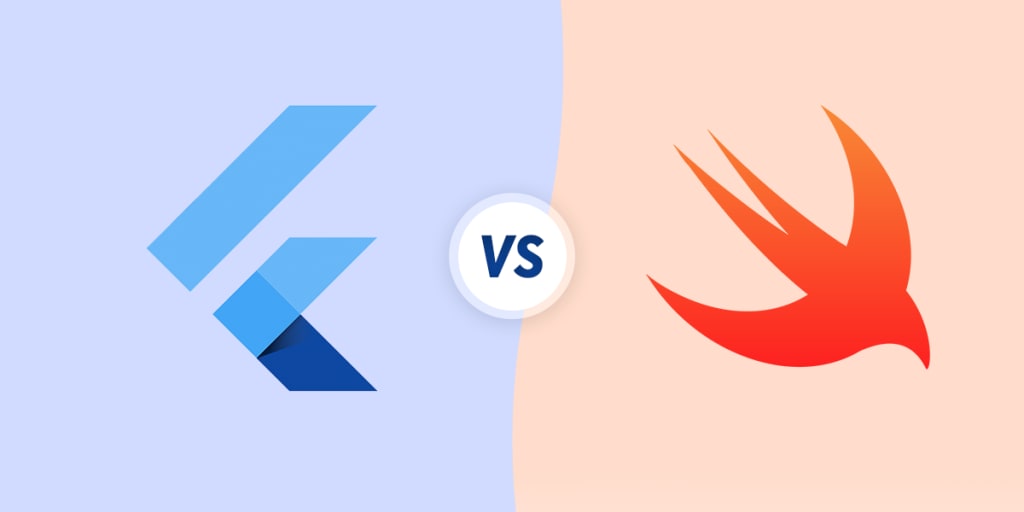
As we all know, Flutter enables the creation of cross-platform apps using a singular codebase. Swift, on the other hand, is a high-level, general-purpose, multi-paradigm, compiled computer language that was introduced to replace Objective-C, Apple's long-standing programming language.
Additionally, there are a number of other distinctions between the two frameworks that, while minor, have a significant effect on the final result. In 2023, the Flutter vs Swift argument will be the new hot topic among product owners. The need for iOS app creation is growing daily in tandem with the expansion of the Apple ecosystem, but there is still the vexing decision of whether to use Swift or Flutter.
In order to address this problem, this blog post compares the two well-known tech stacks in-depth on a number of criteria, along with a few use cases and related topics, in order to help you make a decision about which one to use for the creation of your subsequent iOS app.
In-Depth Analysis of Flutter vs Swift
Both Flutter and Swift have existed in the computer industry for a sizable amount of time. While Flutter shortens the creation period. Swift demands more time to complete. Now that we have a basic knowledge of the two, let's compare Flutter vs Swift in-depth on a number of different criteria in order to gain a deeper understanding of the metrics.
Development and Cooperation
Swift and Flutter both provide compelling arguments for integration and development. On the one hand, Flutter offers a variety of packages and plugins that you can incorporate into your apps. And it permits the incorporation of outside systems like Google Maps and Firebase. Additional system APIs and frameworks in Swift support the creation of effective iOS apps. Additional advanced tools and features for iOS application creation are provided by Swift and the Xcode IDE.
Application Size
Flutter has a small runtime that makes it easier to create inexpensive, quick, and small mobile apps. Tree sharing and code spitting are just two of the many tools and optimizations it has that serve to further reduce the size of the application.
Swift, a native iOS framework, facilitates the creation of lightweight and effective iOS apps. Its compiler aids in programme size reduction and performance optimization. Additionally, a variety of optimization methods, including whole-module and link-time optimization, are available. These assist in further reducing the Swift apps' application size.
Stability
Despite their youth in the market, Flutter and Swift are both reliable and private. A committed group of developers at Google is focusing on performance enhancements for Flutter. Flutter has remarkable stability and dependability as a result. In order to find and fix flaws before they negatively impact users, it has automated testing tools. While Swift prioritises dependability and safety. Swift's Apple engineers make every effort to avoid any errors or crashes. An excellent user experience is made possible by this.
User Interfaces, or UIs
Flutter offers a wide range of components and tools to allow the creation of upscale customizable and responsive Designs when it comes to the Interface. It also has a variety of pre-built UI widgets and elements that can be customised to meet the needs of the application's identity and design. Additionally, Flutter's adaptable layout system enables programmers to create intricate user interfaces swiftly and easily.
Documentation
Flutter is simple to learn thanks to its comprehensive documentation, which includes explanations and examples. Developers can test out new tools and observe changes in real time thanks to the documentation's excellent writing. In-depth literature for Swift is also available, covering syntax, types, classes, functions, and more. You can create and test code in real time using its interactive documentation, Swift Playground. As a result, we can assume that Swift and Flutter both have extensive literature.
Development Cost
Swift and Flutter are both open-source platforms. However, because Flutter is cross-platform compatible, it is more cost-effective than Swift. And while Flutter offers both an iOS and a Mobile apps with a single codebase, Swift only offers an iOS app. Due to this, using Swift results in higher development costs.
Learning Curve
If you are already familiar with element languages like Kotlin or Java, learning Flutter will be a breeze for you because of its simple and quick learning curve. Additionally, the extensive and thorough guidance makes it even simpler to learn Flutter, though mastering this framework still takes work.
Swift's learning environment is complicated compared to Flutter's. Swift can be challenging for programmers who are unfamiliar with functional programming or the creation of iOS applications. Compared to Flutter, it has a more challenging programming environment that takes more time to learn. Additionally, it has a sizable and intricate standard collection, which is yet another challenge to learn.
Conclusion
As a result, you can choose between Swift vs Flutter when creating mobile apps depending on your individual requirements and tastes. While Flutter offers cross-platform development, quick reload, and rich widge, wift offers native speed, a robust type system, and powerful development tools like Xcode. In the end, which option you choose will rely on your priorities and the needs of your app. You can speak with the top flutter app development company to gain confidence and advance your flutter development in accordance with your needs and requirements.
About the Creator
Bacancy
A Leader in Agile and Lean Software Development






Comments
There are no comments for this story
Be the first to respond and start the conversation.